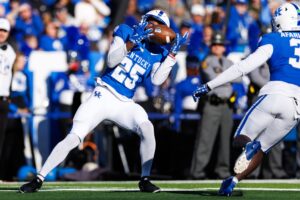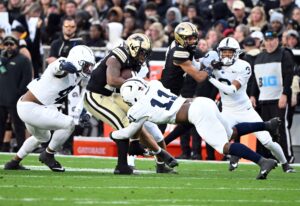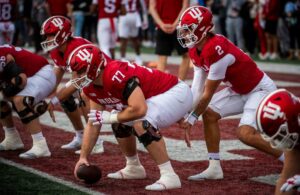There are drastic changes happening in college football right now. Many are happening as a result of rulings made by courtroom judges. Lawsuits are being settled and laws are being rewritten that will affect college football very soon. One school that seems to be in the middle of it is Clemson.
The school filed a lawsuit against the ACC, then had the ACC file a countersuit. There was also a new bill signed in South Carolina regarding Name, Image, and Likeness which Clemson and Dabo Swinney were heavily involved in creating. Lastly, there was a huge settlement in the House v. NCAA case that will affect every Division I college program in a major way. So what do these laws and settlements say and how will they affect Clemson football?
Clemson v. ACC
One of the first major lawsuits to occur this off-season was the lawsuit Clemson filed against the ACC in March. This came after Florida State also filed its own lawsuit against the conference. In Clemson’s case, the school is looking for a “Declaration of its rights” from the ACC. According to the ACC, if Clemson were to leave the conference, the school would still not own its own media rights. The ACC claims this is because of the league’s contract with ESPN, and the conference Grant of Rights.
The university is also saying the financial penalty for leaving the league is too harsh. The current deal says that member schools who opt to leave the league before the end of said deal must pay a fee three times the amount it takes for the conference to operate. That figure as of today is around $140 million.
In response, the ACC has filed a countersuit saying Clemson agreed to the terms of the deal knowing exactly what it said. Therefore, they must abide by the said deal. No rulings have been made and there won’t be for either case until the Florida State v ACC cases get settled. While Clemson has not outright said it plans to leave the ACC, this decision put the writing on the wall.
New South Carolina NIL Law
A couple of months later on May 21st, South Carolina Governor Henry McMaster signed Bill H. 4957. It is a bill about name, image, and likeness for college athletes in the state of South Carolina. The bill is intended to help schools provide student-athletes with better NIL opportunities. Both state and school officials hope this will put South Carolina institutions on a more level playing field than others around the country.
The original NIL law in South Carolina was signed in 2021. At that time collegiate athletes just became allowed to profit off of their own name, image, and likeness. That old bill put many restrictions on the South Carolina schools though, as state officials assumed the NCAA would have its own. The biggest restriction was that institutions could not directly or indirectly create or facilitate NIL opportunities for student-athletes. As it turns out the NCAA did not place many rules on how to approach NIL for schools. The South Carolina schools, namely Clemson and South Carolina, felt this put them at a disadvantage and worked with lawmakers to create a new bill.
The new bill allows South Carolina institutions to “identify, create, solicit, facilitate, and otherwise enable opportunities for currently enrolled intercollegiate athletes to earn compensation.” How much a school participates in its athletes’ NIL opportunities is completely up to the school and the athlete. The bill though prohibits institutions from compensating its players directly. All compensations must come from some kind of third party or collective such as the 110 Society.
At the time, this bill being signed was huge for the South Carolina schools and seemed like it would put them on a more even playing field. They maybe should have waited a few more days to finalize it though.
NCAA House Settlement
Just two days after the state of South Carolina passed its new bill, the House v. NCAA lawsuit was settled. This case involved former and current student-athletes who alleged that the NCAA violated antitrust laws. They said the organization did this by implementing and sustaining a model that imposed rules preventing student-athletes from profiting from their Name, Image, and Likeness. The settlement requires that the NCAA and its member conferences pay $2.77 billion over the next 10 years to more than 14,000 former and current student-athletes.
Adding to that going forward the NCAA will allow, but not require, member schools to share revenue with student-athletes up to a $20 million cap. This figure could increase or decrease as revenue fluctuates. Along with this, the NCAA will replace scholarship limits with roster size restrictions. The terms of the settlement will not go into effect until the 2025-2026 school year as they await approval.
This is a major settlement that will change the landscape of college football quickly. Players being compensated for the billions they make their institutions was inevitable and needed to happen. The student-athletes being treated more as employees though could have both positive and quite a few negative consequences. What will be interesting is how South Carolina institutions will react to this. How the state will adjust to this after just passing the new bill will be must watch as well.
What This All Means For Clemson’s Future
For the Tigers, more specifically Swinney, figuring out how to adjust to all these new changes is going to be a challenge. How fast he is able to do it with how rapidly the changes are coming in is going to be an even bigger task.
Many this offseason have criticized Swinney’s reluctance to change. Some of these critics might be surprised to learn that Swinney played such a big hand in getting South Carolina officials to fix the NIL law for the state. Swinney is not someone to stubborn to adjust, but more someone who likes to do things by the book. It is a huge reason Swinney does not do well recruiting guys out of the portal. He refuses to try to outbid other schools or tamper with players who have indicated they are committed elsewhere. The new NIL law for the state might have been able to help with that a bit. That was until the bill that has a caveat saying schools can’t pay players directly was signed two days before it was settled that players are now allowed to be compensated directly by their school.
That is why it will be interesting to see what the state decides to do as the settlement gets approved. If Swinney believes there is a way he can use the new rules to his advantage he will do it. He is old school though and won’t compromise those old Southern morals to get ahead.







